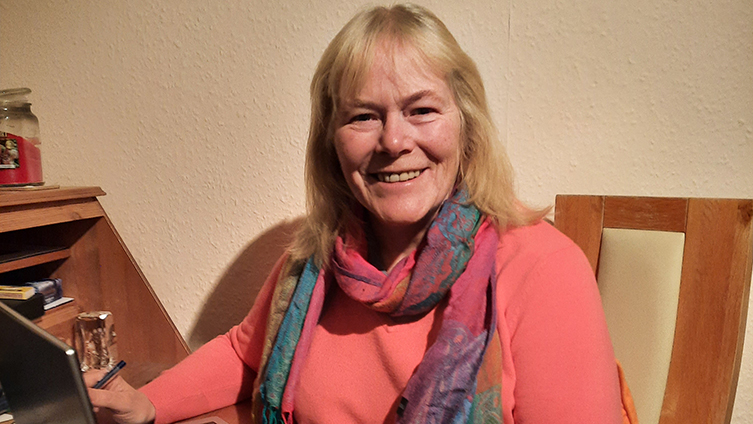
Lucy chats to our Writer Of The Week, Michael Ingram.
Michael’s short story, “Nooks And Crannies”, is in this week’s issue.
Welcome, and congratulations on being our Writer Of The Week! Please tell us about your writing. Have you always written? Combined writing with other work?
I am a marine biologist by profession. This has enabled me to travel widely, and I spent a number of years writing technical articles about fish farming and sea beasties.
I was lucky enough to balance writing with both work and travel. Wherever I am, I always carry a notebook.
After many years of standing in cold water wrestling with salmon, lobsters and an eclectic group of marine creatures, I decided I preferred to keep dry and warm . . . so I took up writing.
“Nooks and Crannies” is the fourth story you’ve had published in “The People’s Friend”, with a fifth already scheduled for October. What encouraged you to submit to us?
I enjoy “people watching” wherever I am — at airports, on ferries or in a café.
With notebooks filled with characters and situations, I have a constant supply of ideas.
But as the walls of my house filled with rejection slips for my novels, I started writing short stories.
A writer friend of mine suggested I read the “Friend” and try some submissions.
She said the “Friend” was the best short story magazine, and the most difficult to “get into”.
So there was the challenge!
Tell us about “Nooks and Crannies”. Where did the inspiration for this story come from?
My youngest daughter runs a café in Bristol.
She converted offices into a café full of small, cosy rooms, soft music and fantastic ambience. On one of my visits, I discovered she had a Book Club going in one of the back rooms.
She also had a daily visitor: a young, aspiring writer sweating over her first novel! I just joined up the dots!
The theme of never giving up runs through “Nooks and Crannies”. What advice do you have for authors who have yet to have a successful submission?
Never give up. I have used this motto throughout my life to good effect.
However, it has been severely tested in the ‘writing world.’
Used to having my articles accepted on a regular basis in technical journals, the switch to the short story market was akin to stepping into a constant, ice-cold shower. I came down to earth with a bump! Rejection followed rejection before that first, glorious email headed ‘success’ popped into my inbox. What made the difference?
Firstly I had to learn to write what the readership wanted, not necessarily what I wanted.
My advice to aspiring writers (and I am still one of those), is to read the target magazine, see what they want and listen to what the editor says. Even if it is a rejection, take note if advice is offered.
After all, it is the fiction editor who decides how good your story is, not you.
I wrote my first successful submission many years ago, but it was constantly rejected. I thought the ending was perfect, but none of the editors thought the same.
Nice encouraging comments . . . suggestions . . . but no sale.
I knew better, until one day the penny dropped.
I changed the ending. It was my first sale.
So, read, listen and learn, and never give up!
You occasionally travel abroad to write. Why is that?
I have travelled all my life, which has provided me with a rich source of material, scribbled almost illegibly in my notebooks.
While I finish off most of my stories at home (I am trying to write a novel for each of my children, as well as fantasy stories for their children), life is still very busy.
My ideas come in the tranquil surroundings of what I call my “writing hovel” in the middle of darkest France.
Interrupted only by a couple of passing tractors a day, it is the ideal place in which to sit, remember, dream and develop storylines.
Scribbled notes turn into scrawled stories which I type up on my return home.
What sort of fiction do you enjoy reading? Any favourite authors? Why?
I love historical novels. I devour Bernard Cornwell and Philippa Gregory.
Ancient Rome draws me in. You’ll find me in the Arena in Verona listening to Carmen and imagining gladiators clashing swords below me.
My wife hopes our travels will avoid castles, as she knows I will be leaping up and down the ramparts lost in my imagination.
I think writing historical fiction is a magical art.
Like many “Friend” stories, ‘Nooks and Crannies’ was accepted after a rewrite. Do you have any tips on how to work on a successful rewrite?
Re-writes. Hmmm. Not easy.
I always try and write a story to its natural length, then edit. Then edit again.
If a re-write is required after that, I look more closely at the structure of the events.
How important is that character to the main story? Is that paragraph essential? The important thing is to maintain the core storyline and snip off the unnecessary fringes.
As my English teacher used to say: “keep it tight, tight, then tighter still. Does the reader really need to know what she had for breakfast?”
Notebook and pencil, or laptop? Kitchen table, or study? Blank wall, or inspiring view?
Notebooks galore. I always carry a notebook and pencil.
I write with a pencil for notes, and the first ideas on A4 foolscap. Then a fountain pen. Old style.
I love the feel of ink flowing on the page.
Correct and correct again, then edit. Leave it overnight and re-read in the morning.
Then type the final draft on my laptop and proof-read at least twice.
Then cross fingers and send.
And a P.S. – what’s your top tip for an aspiring Writer Of The Week?
Never, ever give up. But DO research what your target magazine really wants.
For more from our Writer Of The Week series, click the tag below.




